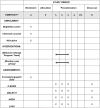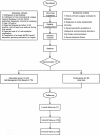Effects of the transtheoretical model-based self-management program on behavioral change in persons with epilepsy: Study protocol for a randomized controlled trial
- PMID: 39585910
- PMCID: PMC11588227
- DOI: 10.1371/journal.pone.0305547
Effects of the transtheoretical model-based self-management program on behavioral change in persons with epilepsy: Study protocol for a randomized controlled trial
Abstract
Introduction: Self-management applications are cost-effective and scalable for epilepsy treatment. However, there is a limited long-term quantitative evidence regarding their effectiveness. The Transtheoretical Model (TTM) offers a psychological framework that tailors self-management plans to the individual's stage of behavioral change. This approach aims to address utilization needs, reduce information overload, minimize the adverse effects of self-management, and enhance the overall effectiveness of interventions for individuals with epilepsy.
Methods and analysis: This will be a randomized, double-blind, the clinical trial involving two groups of adults diagnosed with epilepsy. In addition to treatment as usual (TAU), the intervention group will receive an intervention program constructed from TTM combined with self-management as part of the treatment plan. The control group will receive TAU only. Prior to the intervention, the participants will undergo an initial assessment to determine their current stage of behavioral change to facilitate the implementation of targeted behavior support strategies. Additionally, participants will receive weekly 30-minute educational videos on epilepsy. The goal is to enroll 160 adults who have been diagnosed with epilepsy for at least six months and are receiving medication. Data collection will encompass an assessment of C-ESMS, HADS, QOLIE-31, and LSSS. These parameters will be evaluated at baseline, as well as during follow-up periods at 1, 3, and 6 months post-intervention.
Discussion: Existing self-management interventions for people with epilepsy primarily focus on knowledge and psychological factors. Discrepancies in research design, intervention plans, and patient characteristics have contributed to inconsistent outcomes in previous studies. This study seeks to advance the field by integrating the TTM with empirically supported self-management practices. The delineation of behavioral change stages within the TTM framework is expected to form a structured intervention protocol. This study will inform standardized, evidence-based epilepsy care practices.
Copyright: © 2024 Li et al. This is an open access article distributed under the terms of the Creative Commons Attribution License, which permits unrestricted use, distribution, and reproduction in any medium, provided the original author and source are credited.
Conflict of interest statement
The authors have declared that no competing interests exist.
Figures
Similar articles
-
(Cost)-effectiveness of a multi-component intervention for adults with epilepsy: study protocol of a Dutch randomized controlled trial (ZMILE study).BMC Neurol. 2014 Dec 24;14:255. doi: 10.1186/s12883-014-0255-3. BMC Neurol. 2014. PMID: 25540089 Free PMC article. Clinical Trial.
-
Implementation of an intervention to improve the adoption of asthma self-management practices in Peru: Asthma Implementation Research (AIRE) randomized trial study protocol.Trials. 2020 May 4;21(1):377. doi: 10.1186/s13063-020-4207-5. Trials. 2020. PMID: 32366314 Free PMC article.
-
Program of Active Consumer Engagement in Self-Management in Epilepsy: Replication and extension of a self-management randomized controlled trial.Epilepsia. 2020 Jun;61(6):1129-1141. doi: 10.1111/epi.16530. Epub 2020 May 13. Epilepsia. 2020. PMID: 32401339 Clinical Trial.
-
Telephone interventions for symptom management in adults with cancer.Cochrane Database Syst Rev. 2020 Jun 2;6(6):CD007568. doi: 10.1002/14651858.CD007568.pub2. Cochrane Database Syst Rev. 2020. PMID: 32483832 Free PMC article.
-
Behavioural modification interventions for medically unexplained symptoms in primary care: systematic reviews and economic evaluation.Health Technol Assess. 2020 Sep;24(46):1-490. doi: 10.3310/hta24460. Health Technol Assess. 2020. PMID: 32975190 Free PMC article.
References
-
- Sajatovic M, Welter E, Tatsuoka C, Perzynski AT, Einstadter D. Electronic medical record analysis of emergency room visits and hospitalizations in individuals with epilepsy and mental illness comorbidity. Epilepsy & behavior: E&B. 2015;50:55–60. Epub 2015/06/30. doi: 10.1016/j.yebeh.2015.05.016 ; PubMed Central PMCID: PMC4793963. - DOI - PMC - PubMed
Publication types
MeSH terms
LinkOut - more resources
Full Text Sources
Medical



